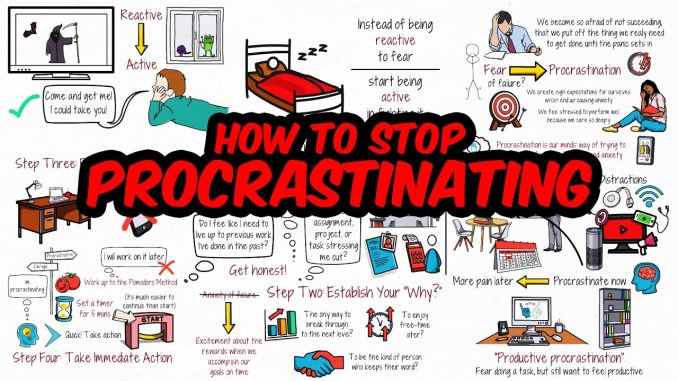
Procrastination is one of the most common challenges students face, regardless of their age, background, or academic level. It’s the subtle yet persistent habit of delaying important tasks in favor of more comfortable or entertaining activities. While putting things off might feel harmless in the moment, it often leads to last-minute stress, rushed work, and missed opportunities for deeper learning. What makes procrastination so tricky is that it’s not always obvious. It can disguise itself as harmless breaks, necessary distractions, or even productive tasks that aren’t truly urgent.
To understand how to avoid procrastination, it’s helpful to first recognize why it happens. In most cases, students procrastinate not because they are lazy or irresponsible, but because they feel overwhelmed. When faced with a large assignment, a tough subject, or a looming deadline, the natural reaction is often avoidance. The brain seeks comfort, and that usually means gravitating toward things that are easier or more enjoyable. Social media, video games, and chatting with friends become tempting escapes. In this context, procrastination is less about time management and more about emotional management.
One of the most effective ways to combat procrastination is to shift your mindset from perfection to progress. Many students hesitate to start an assignment because they feel they don’t know how to do it perfectly. They want to have the right ideas, the perfect introduction, or a flawless plan before getting started. This all-or-nothing thinking creates pressure that leads to paralysis. Instead of aiming to do it all in one perfect session, try starting with just a rough draft or a few basic notes. The simple act of beginning creates momentum, and often, once you’re in motion, it’s easier to keep going.
Breaking tasks into smaller, more manageable steps can also help reduce that feeling of being overwhelmed. A ten-page paper may seem daunting when viewed as one giant task, but if you think of it as writing one paragraph at a time, it becomes far more approachable. Similarly, studying for an exam doesn’t have to mean reviewing every chapter at once. You can divide the content into sections and tackle a little each day. This approach makes the workload feel lighter and gives you a sense of accomplishment as you complete each part.
The environment in which you study can also play a big role in your tendency to procrastinate. Trying to concentrate in a place filled with distractions—like your phone buzzing with notifications, or a TV in the background—makes it far more difficult to stay focused. Creating a dedicated workspace, free from unnecessary interruptions, helps train your brain to associate that space with productivity. Even simple changes like putting your phone on silent or using website blockers can make a noticeable difference in how efficiently you use your time.
It’s also important to pay attention to how you talk to yourself. Procrastination is often reinforced by negative self-talk. Thoughts like “I’m just not good at this,” or “I’ll never catch up anyway,” can lead you to avoid trying at all. On the other hand, adopting a more encouraging internal voice—such as “I may not understand this yet, but I can figure it out”—helps build resilience and motivation. The way you frame your experience has a powerful influence on your behavior.
One helpful trick is to commit to working for a short, defined period. For example, tell yourself you’ll study for just ten minutes. This takes away the pressure of an indefinite study session and makes it easier to begin. Often, once those ten minutes are up, you find yourself willing to keep going. This technique works because the hardest part of any task is usually getting started. Once you’re over that initial hump, it’s much easier to stay engaged.
Procrastination can also be minimized by creating a consistent routine. When you build regular study times into your day, completing academic tasks becomes a habit rather than a decision you have to make each time. This helps reduce the emotional resistance to getting started. Over time, the routine becomes automatic, and the urge to delay starts to fade. Think of it like exercising a muscle—the more often you practice, the stronger your self-discipline becomes.
Another overlooked factor in avoiding procrastination is self-care. When you’re tired, hungry, or emotionally drained, your ability to focus and stay motivated drops significantly. Skipping meals, staying up late, or burning yourself out can make even simple tasks feel insurmountable. Taking care of your body—getting enough sleep, eating balanced meals, staying hydrated—creates the physical and mental foundation you need to perform well academically. It’s hard to stay on top of your work when your basic needs aren’t being met.
There’s also value in acknowledging your successes, no matter how small. When you complete a task you’ve been avoiding, take a moment to appreciate your effort. This builds positive reinforcement and helps reshape your relationship with productivity. Rather than seeing schoolwork as something to dread, you start to experience a sense of control and accomplishment. That change in perception makes it easier to keep moving forward, even when tasks are difficult.
At the end of the day, avoiding procrastination is not about being perfect or productive all the time. It’s about developing habits and strategies that help you navigate your workload in a healthier, more manageable way. It’s also about being kind to yourself in the process. Everyone struggles with procrastination at some point. What matters most is how you respond to those moments and whether you choose to take small steps forward instead of staying stuck. With patience, self-awareness, and the right tools, any student can learn to stay on track and make the most of their academic journey.